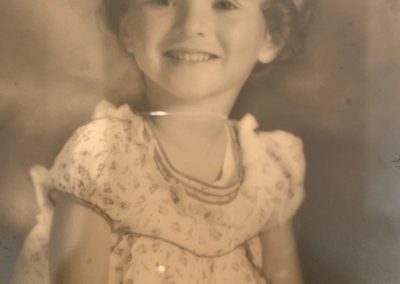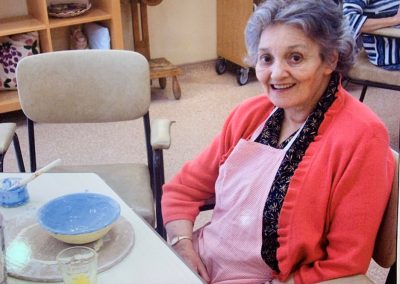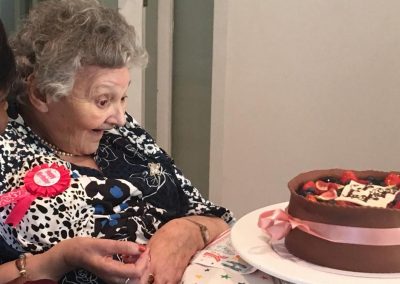Annette’s words for Judith
September 11 2019
My earliest memory of Judith is of her trotting around our garden in Somerset in about 1941 clutching her favourite toy – a black cat called Polly – and keeping close to our gardener, Ashford. He spoke with a dense Somerset accent and Judith spoke I know not what. But they understood one another in a way no one else could. Already Judith was setting a pattern we were to see over and over again – she found ways to cope – she enjoyed close relationships with those responsive to her. The first of these supports was our Nannie, whose relationship with Judith remained a central fixed point until Nannie died in 1995. (See the photo of Judith at 3 after the text below).
At 5, Judith went to the kindergarten run by Randall Hoyle at Peter’s prep school. Soon after she began, the kindergarten teacher must have decided there was a problem and Randall and Grizel Hoyle went to see my parents and tell them Judith was not learning as might be hoped.
It was in this way that our parents began to face the fact they had a child who was not just slower than her speedy siblings but one who had special difficulties. It was a time of stigma for such problem children and shame for the parents. But, for me, I noticed nothing different about Judith. I used to somersault into bed in our shared room, and she was slower, but she loved me telling her stories ‘from my mouth’ as she fell asleep, just as my grandchildren continue to love this.
Yet, as she grew, and as life became more and more constrained for us all in a way – remember, this was long before the liberating late sixties and seventies – Judith was to experience more problems and much constraint.
Back in London, she came to the same school as me but was bullied so my parents moved her to a little dame school nearby in Holland Park, where at 8, she learned to read and write. But number was a problem she never could deal with. She made a special friend there – a little deaf boy called George.
I would say Judith at this time and as she grew up, was happy. And that was a continuing feature of her. That is how people remember her. Camilla Cowie, Randall Hoyle’s daughter, wrote to me this week and described her as ‘dear little Judith’. Nicole Schindler, daughter of one of our father’s great American friends and colleagues, remembers her well as a joyful person to be around. On holiday when we were about 15 and 13 in La Baule, she made a French friend, also called Nicole, on the beach. She laughed and smiled and went to dance classes. Peter Sussman wrote that she so loved a party. And we went together to many dances. ‘What can I say?’ she asked me. But her love of parties never left her – witness her joy with the birthday cake picture below following the text.
At 12, in an attempt perhaps to help her become more independent, my parents sent her to boarding school. But there she wrote in her diary as her hand-writing grew increasingly illegible, ‘I cannot manage’. It broke my heart when years later I saw that.
By the time Peter and I had gone off to Universities, Judith could not really understand what a University was. And at this time there was really just one future she knew about – a girl should grow up, get engaged and be married.
But now she was learning that future was not for her. All her life she clung on to the fact she might get engaged. But would also shake her head. And say, I can’t Annette, I can’t do that.
How to manage?
To our amazement in the family Judith showed her toughness, or, to use the word my son George suggested – her fortitude. She found out about adult learning and took herself off to French classes. My mother helped her find a pottery class and she loved that. Our cousin Oliver Jessel gave her a job in his flower shop. This proved a step too far.
So my parents, believing country life might suit her better, bought Judith a cottage in Sussex – ‘Candlemas’ in Walberton. Nannie left her job at Eton and returned to be her housekeeper and companion. Our Aunt Winnie, wife of our Uncle Dick Jessel, gave her a dog. But Nannie, much as she loved Judith, could not give her the freedom that, as a young woman, she craved. Judith admired the village lads on their roaring bikes, but her lack of freedom to explore with them increased the tension she lived with, and she suffered her first major mental breakdown.
She started to hear the voices that would then stay with her for the rest of her life. Her voices – always friendly and usually just like those of us with whom she was conversing outside her head – were never threatening to her or to anyone else – just a way of learning things, she said. ‘If I didn’t hear them, how would I know things?’ she asked me quite recently. No answer was expected nor would it have been received as useful, had I tried.
There followed years of in and out of different situations until finally she became a long-term resident at St Andrews Hospital in Northampton. Once again, Judith showed her resilience and her capacity to inspire love and care. There she had Sisters Heidi Allen and Christine Burns who were devoted to her. She would never accept that Heidi had died. And wonderful Phillis Hahn came into her life. She is a therapist and social psychiatric nurse who began visiting Judith with our mother and has stayed working with her right up until now. There was a letter from Phillis for Judith in her room as she died.
Meanwhile she clung to her family – Peter and Carol, David and me, her nieces and nephews, and tried to keep up with the growing 12 great nephews and nieces. And for most of her life was devoted also to her cousins, not only on the Jessel side but also including the LeVays with whom we went on holiday many times.
Thank goodness for new policies that made St Andrews finally unsuited to Judith – tight security for patients, not open wards.
And so to Nightingale House in 2009.
At Nightingale she was transformed with freedom and opportunity she had not had for a long time. She loved the cooking and the pottery (see the picture after the text below). She became known to everyone at Nightingale as first she walked around buying too much at the shop, and greeting everyone and learning their names.
We were nearer for her to visit us. We went to theatre, to the Albert Hall, she continued to love art galleries and going out for meals, and grey-hound racing, and shopping.
But the most important thing was the development of new relationships with people who took the time to understand her and to give her the care she needed. Jaccui became her devoted number one carer who understood her when others could not and protected her always. Jaccui (following Phillis) brought her regularly on holiday to our Amble, Northumberland, cottage with me, which Judith loved. And then as her peripheral neuropathy became worse, and a hoist was needed for every transfer and she was wheelchair user number one, she had one to one care and Debra and Fola came into her life. Daphne Thomas was her constant and careful housekeeper too. This was in a setting where many, many knew her and accepted her telling them off, taking dislikes and ignoring people too. She could be really difficult. Challenging is perhaps the right word.
Judith also discovered Judaism in her own fashion – going to the ‘Good Shabbat” services run by Rafi whom she loved, in the little shul there every week. (Judith never just said Shabbat” – it was always “Good Shabbat”.) Perhaps the cake and wine at the end was also a draw. There will be a special mention and prayers there for her one Shabbat soon. (This was held and Judith’s name is inscribed on the panels of the schul.)
So, my sister, Judith, was different and yet she was the same as all of us. Sometimes people with her double whammy are seen as having a ‘little life’. But Judith’s, though difficult, was not little. Through her own qualities and efforts as well as ours, she had richness, love and delight as well.
Annettexox
Emily’s words for Judith spoken at her funeral
September 11 2019
My mother has spoken about Judith and her life, so now I want to talk about what we, members of the next generation in her family, learned from Judith.
These are some of her GIFTS to us:
• Patience. Among my earliest memories were calls from Judith that went on for hours. Both when she was just talking about not very much, and when she called to announce that Rachel was perhaps engaged to Prince Andrew, or that Annette was definitely having another baby and why hadn’t we told her? Ralph and George and I developed our own techniques for listening and not listening at the same time, long before one could put someone on speaker phone or wander away from the kitchen to do something else while she was talking. More recently, I’ve seen my own children learn to be patient too, when talking with Judith, to take a deep breath and really listen to what she was saying, to ask her a question that they knew she would want to answer in order to get her talking. Patience is a virtue that I’ll spend my life struggling with, but perhaps if I can tap into what I learnt from Judith, I’ll continue to improve.
• Understanding. I don’t remember a time when I didn’t know that Judith was different. I remember reading a book around the time we lived in America, so I was 8. It was one of those slightly worthy 1970s stories. In this, a boy had a sister with a learning disability, and was teased about it at school, being told that no one would want be friends with him because of his sister. Of course in the end he found a friend who loved his sister, but the book made me wonder if I should be less forthcoming about saying my aunt had a learning disability, if it was something to be ashamed of. But, I realised, I’d never felt ashamed and no one had ever laughed at me or shied away from me when I mentioned it, so it must be ok. Judith helped us with this in that while she laughed a great deal when we were with her, she laughed with us and for us, not at us and definitely not at herself.
• Perseverance. Over my lifetime, Judith’s health, attitudes and abilities changed a great deal. At some points we could have a proper conversation about the events of the day, at others it was hard to get her to concentrate for even a second as she drifted away into the worlds in her head. But I remember precisely the day when I was about 18. I drove her back to Holly Lodge Gardens and she had a James Herriot novel with her, the same one I was reading at the time. We talked about Christopher Timothy and what it would be like to live in Yorkshire. At the time I had no understanding of what it must have taken for her to get through that book, and I just accepted that this was one of the many facets of her life and her abilities. Later on, I greatly admired her patience with pottery, and the strong opinions she had about what she would and would not make. At the times in her life when she had the energy and the mental wellness to have a go at something hard, something new, she made the most of it. And even when she was very unwell, she could surprise us with a quick, to the point joke in the midst of what might be an unintelligible fantasy.
• Manners. Judith had impeccable manners. When I was young this included dressing for dinner, and being quite cross when we didn’t. It included table manners. On one occasion I took her to tea with my then boyfriend’s family. Mark’s mother, Mary, passed Judith a slice of cake and, as she did so, the cake toppled over and Mary righted it with a finger. “Fingers, Mary!” Judith admonished her. I was embarrassed, but “you’re quite right Judith,” Mary replied. And her more modern-era manners persisted to the end of her life. This included postcards from every holiday, birthday, anniversary and thank you cards, calls for birthdays and real concern to make sure gifts were what we wanted. As well as chasing us if thank you cards didn’t materialise soon enough after an event. To be clear, her manners did not extend to refraining from telling us in no uncertain terms if a gift was not to her liking, but a thank you card would be forthcoming nonetheless. My mother will tell you that I’ve only partially absorbed this lesson, but it’s not because Judith didn’t exemplify at every turn the very best of manners. Real gratitude, and adherence to the rules as she had experienced them growing up, and internalised them. Rules that at their best, are meant to ease experiences for everyone involved.
• The last written card we received from Judith was for Phoebe, offering to take her out to buy a watch together. We weren’t able to make that shopping trip happen, but I know Phoebe will always have that thought with her, just as Jasper will remember the last time we had dinner with Judith at Granny’s house, and Judith wanted to sit next to him so he could tell her about his school.
All these gifts and more I know are meaningful to all of her family, as well as, I’m sure, to many of you who knew her, and loved her. Thank you Judith, for the gifts you gave us that already are giving to a new generation.



